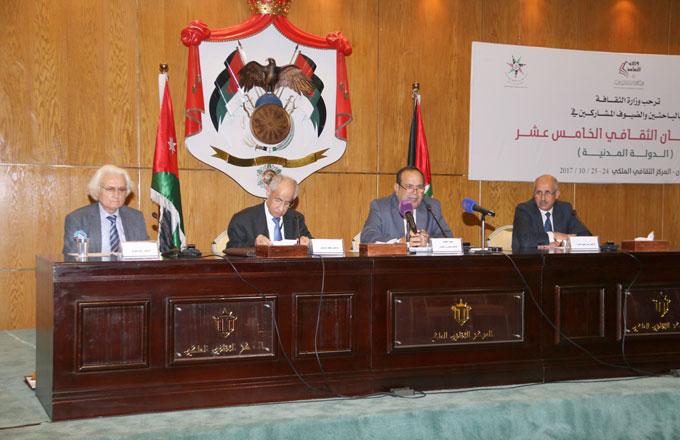You are here
Amman Cultural Forum explores state-religion relation
By Fares Al Abed - Oct 25,2017 - Last updated at Oct 25,2017
AMMAN — Discussions on the second day of the 15th Amman Cultural Forum on Wednesday focussed on the modern civil state and its relationship with religion.
Held at the Royal Cultural Centre under the title “civil state”, the forum attracted the participation of Arab and foreign researchers, as part of events planned to celebrate Amman as the Capital of Islamic Culture 2017.
The second day of the forum, which is held under the patronage of His Majesty King Abdullah, started off with Moroccan writer and lecturer Abdulelah Bilqziz’s presentation on the relationship between the state and religion.
Noting that the state is the only authority entitled to judge people in daily affairs as it is “mandated by society”, he said: “In our view, the state is not the result of society’s efforts and achievements, but it is the one that produces society and establishes it in a universal and organised entity.”
“Therefore, there is no society in history, in the sense we understand it, instead, there is a political society, which is the state,” Bilqziz said.
Hassan Musa, an expert in religious affairs and minorities, said that, in most European countries, Muslim minorities have acquired a legal status that gives them the opportunity of a “positive integration” into the society they live in, in a way that does not deprive them of their individual features and that does not affect their cultural identity.
Musa went on to discuss the relationship between minorities and society, saying that the Muslim minorities living in foreign countries establish a relationship towards society building on their cultural and religious specificities which are intrinsically open to others.
“This Islamic culture, which is characterised by tolerance of other religions and cultures without discriminating against race, gender or religion, is based on the necessity to coexist with others, which has become a defining feature of the new world,” he added.
Mohammad Talabi, a Moroccan political expert, said that the “cultural advancement” of nations requires the availability of five tools enabling cultural production, which are “the nation, the homeland, the state, the language and the message”.
“Historians distinguish between history and prehistory through the birth of language. But the birth of the state is, in my opinion, a decisive moment between prehistory and history,” he said, adding “the state is the finest cultural production invented by the human mind”.
“The state is a governmental authority that supervises the interaction between the country and its citizens,” Talabi added.
“In the absence of order in the relationship between the region and its citizens, as well as among the population itself, there will be no stability. Therefore, it will create an absence of state as an entity fostering development, urbanisation and security,” he concluded.
Related Articles
AMMAN — Culture Minister Nabih Shuqum on Tuesday inaugurated the 15th Amman Cultural Forum held under the title "civil state" at the Royal C
The Jordan Press Foundation will issue a supplement with Al Rai Arabic daily on Tuesday that focuses on sectarianism, extremism and the future of the region.
AMMAN — Jordan and Morocco reject the so-called “deal of the century”, Minister of Political and Parliamentary Affairs Musa Maaytah said on

















